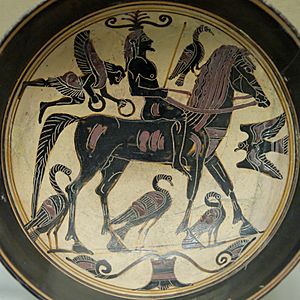Augury facts for kids
Augury was an ancient Roman practice. It involved trying to understand messages from the gods by watching how birds flew. People believed these messages, called omens, could tell them about the future.
The person who interpreted these bird signs was called an augur. When an augur looked for these signs, it was known as "taking the auspices." The words 'augur' and 'auspices' come from the Latin word auspicium. This word means "one who looks at birds."
Depending on the birds and their actions, the signs from the gods could be good or bad. Good signs were called auspicious, and bad signs were inauspicious. Sometimes, augurs might even make up bad signs. They did this to delay important government events, like elections, for political reasons.
Understanding Ancient Bird Omens
People have believed in bird omens for a very long time. This practice was already thousands of years old by the time of ancient Greece. For example, letters from ancient Egypt around 1400 BC mention a king needing an "eagle diviner." This shows that people in different parts of the ancient world used birds to predict things.
In early Greek culture, people like Calchas were famous bird-diviners. Calchas was a seer who helped the Greek army in the story of the Trojan War. Later, in Greece, looking at the livers of sacrificed animals became more popular for telling the future. This was done by people called haruspices. Some ancient thinkers, like Plato, thought that liver reading was more important than bird augury.
Romulus, Remus, and the Founding of Rome
One of the most famous stories about augury is linked to the founding of the city of Rome. The twin brothers, Romulus and Remus, wanted to build a new city. But they disagreed on where to build it. Romulus wanted the city on the Palatine Hill. Remus thought the Aventine Hill was a better, more protected spot.
To decide, they agreed to use augury and ask for the gods' will. Each brother sat alone on the ground, waiting for a sign. According to ancient writers, Remus saw six vultures fly by. Then, Romulus saw twelve vultures. Because Romulus saw more birds, it was believed that the gods favored his choice. This led to Rome being founded on the Palatine Hill.
See also
 In Spanish: Auspicio para niños
In Spanish: Auspicio para niños


